If your cat has allergies, it's important to work closely with your veterinarian to identify the specific allergens and develop an appropriate treatment plan.
In general, hypoallergenic cat foods may be recommended. These foods are formulated to minimize the risk of triggering allergic reactions.
You might want to look for foods that contain a minimal number of ingredients because this can help identify and eliminate potential allergens. Common protein sources in Limited Ingredient Diets (LID) include duck, venison.
Hydrolyzed protein diets might also be worth considering as, in these diets, the proteins are broken down into smaller fragments, reducing the likelihood of an allergic response. The proteins are usually hydrolyzed to a size that is too small to stimulate an immune response.
Some cats may be allergic to grains, so opting for a grain-free formula may be beneficial. However, it's essential to note that grain allergies in cats are relatively rare.
Alternatively, you could introduce novel protein sources that your cat hasn't consumed before. For example, if your cat has been eating chicken-based food and develops an allergy, you might want to try switching to a food with rabbit or fish as the primary protein instead.
In some cases, your veterinarian may recommend prescription hypoallergenic cat food. These diets are specifically formulated for cats with food allergies.
It's crucial to consult with your veterinarian before making any changes to your cat's diet. They can conduct tests to identify specific allergens and recommend an appropriate dietary plan. Additionally, sudden changes in diet can sometimes lead to digestive upset, so it's advisable to transition your cat to a new food gradually. Always monitor your cat for any signs of improvement or adverse reactions.
Our top picks
- Darwin's Natural Selections Turkey for Cats (Raw) Jump to review
- Smalls Smooth Fish (Fresh) Jump to review
- Vital Essentials Freeze-Dried Raw Rabbit Mini Nibs Entree Jump to review
- Tiki Cat Puka Puka Luau Succulent Chicken in Consomme (Wet) Jump to review
- Natural Balance Limited Ingredient Duck & Green Pea Formula (Dry) Jump to review
- Canidae Pure Goodness Salmon Recipe (Dry) Jump to review
-
Darwin's Natural Selections Turkey for Cats (Raw)
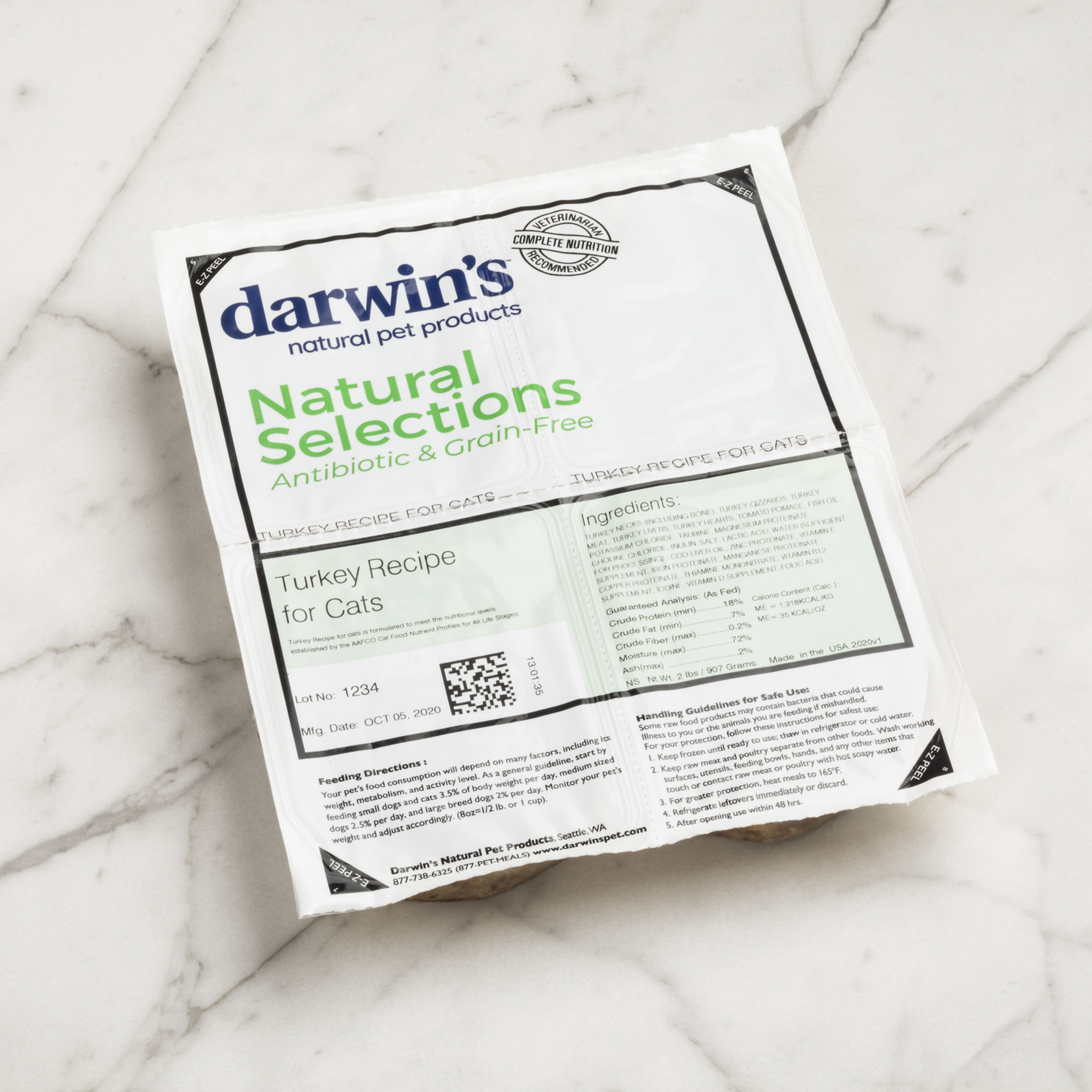
Darwin’s Natural Selections Turkey for Cats received the Cat Food Advisor’s highest rating: 5 stars.
It is one of three products in a range made by Darwin’s, one of the first pet food companies to bring raw pet food directly to pet parents. Based in Seattle, Darwins has been formulating raw pet foods for 15 years.
Darwin’s Natural Selections Turkey for Cats derives the bulk of its protein from turkey, which is naturally rich in the 11 essential amino acids required by a cat to sustain life.
Dry matter label analysis reveals a wet recipe containing 53.3% protein, 40% fat and 0% carbohydrates . . . with a fat-to-protein ratio of 75%.
Natural Selections’ meals are minimally processed to preserve the vital nutrients a cat needs. All meat is pasture-raised and grass-fed, so your pet is receiving top-quality meat.
Read our review of the full Darwin’s Natural Selections (Raw) range hereThings we like
- Specific formulas for health issues
- Top quality ingredients
- In-house consultants to help tailor a meal plan
Main Ingredients Turkey necks (bone-in), turkey gizzards, turkey, turkey liver, turkey heart Texture Wet Type Raw Protein Percentage 53.3% AAFCO Standards Maintenance Best For Adult Cats Get 10lbs of Darwin’s Raw Food for $14.95
Sample buyer review...
"I’m a physician and am picky about what Amanda eats. After switching her to Darwin’s, I was amazed not only at the increase in her energy level but also the improvement in her coat and her new and passionate interest in her meals. Thanks for the care you put into your meals."
-
Smalls Smooth Fish (Fresh)
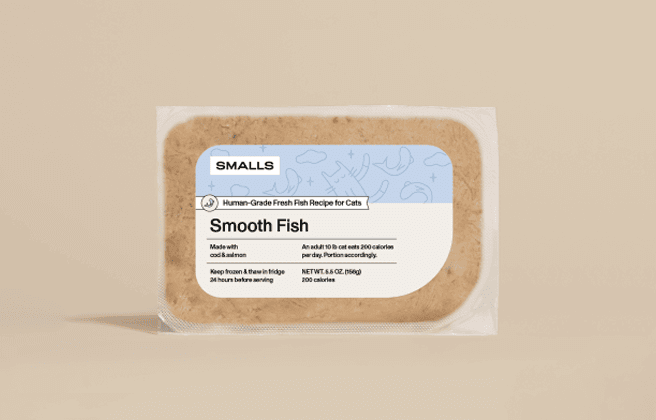
Smalls Smooth Fish received the Cat Food Advisor’s highest rating: 5 stars.
It is one of seven foods in this range made by Smalls, a company founded in 2017. The food is manufactured in a human-grade commercial facility near Chicago.
Smalls Smooth Fish derives the bulk of its protein from cod, a marine species of fish native to North America’s Atlantic and Pacific coasts. It is a quality item with raw fish containing up to 73% water.
Dry matter label analysis reveals a wet recipe containing 55.8% protein, 26.9% fat and 9.3% carbohydrates . . . with a fat-to-protein ratio of 48%.
Using high-quality human-grade ingredients, Smalls’ recipes come in a variety of flavors and textures. They are developed in partnership with veterinarians and meet AAFCO standards.
Read our review of the full Smalls (Fresh) range hereThings we like
- High protein
- Preservative free
- Contains omega-3
Main Ingredients Cod, salmon, pumpkin, nutritional yeast, peas Texture Wet Type Fresh Protein Percentage 55.8% AAFCO Standards All life stages Best For Kittens, cats and senior cats 35% off your first order
Use code CATFOODADVISOR
Sample buyer review...
"We have a senior cat who is going through some tummy issues, and this food change has been amazing. She is back to eating and gaining weight. I can already tell her fur and skin are better and the smooth fish is her favorite. "
-
Vital Essentials Freeze-Dried Raw Rabbit Mini Nibs Entree
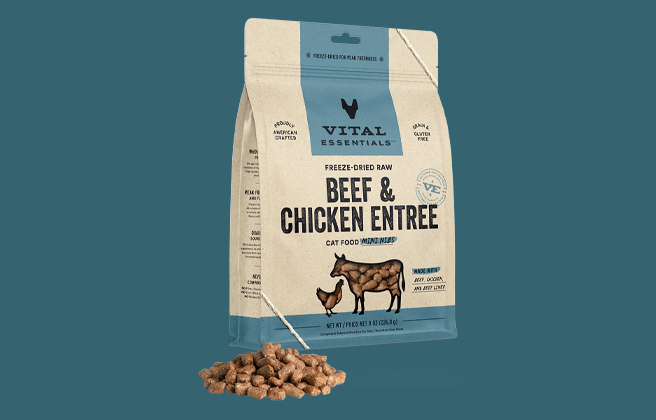
Vital Essentials Mini Nibs Rabbit Entrée (Freeze-Dried Raw) received the Cat Food Advisor’s second-highest rating: 4.5 stars.
It is one of six products in a range made by Vital Essentials, the flagship brand of Carnivore Meat Company – a leading manufacturer of raw frozen and freeze-dried pet foods and treats in America.
Vital Essentials Rabbit Entree recipe derives the bulk of its protein from rabbit, which is naturally rich in all 11 essential amino acids required by a cat to sustain life.
Dry matter label analysis reveals a wet recipe containing 59.8% protein, 16.3% fat and 15.9% carbohydrates . . . with a fat-to-protein ratio of 27%.
Vital Essentials Mini Nibs freeze-dried raw cat food is high in protein and essential fatty acids. Freeze-dried ingredients can be considered nutritionally superior to meat meals due to the gentleness of the process used to create them.
Read our review of the full Vital Essentials Mini Nibs (Freeze-Dried Raw) range hereThings we like
- High animal-sourced protein
- No added hormones or antibiotics
- Grain and gluten-free
Main Ingredients Rabbit, rabbit liver, rabbit heart, rabbit kidney, rabbit lung Texture Nibs Type Freeze-dried raw Protein Percentage 59.8% AAFCO Standards All life stages Best For Kittens, cats, senior cats Save up to 35%
with Autoship
See discount in cartSample buyer review...
"My cat has severe food allergies and this is one of the few things he can eat."
-
Tiki Cat Puka Puka Luau Succulent Chicken in Consomme (Wet)
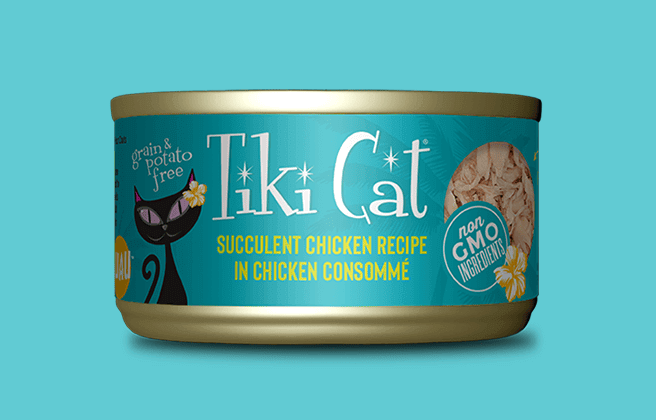
Tiki Cat Puka Puka Luau Succulent Chicken in Chicken Consomme Grain-Free recipe received the Cat Food Advisor’s second highest rating 4.5 stars.
It is one of 16 foods in this product range by Tiki Cat, a company founded in 2005 by husband and wife, Christine and Robert Hackett. Christine had previously worked in research and development for PetCo.
Tiki Cat Puka Puka Luau Succulent Chicken in Chicken Consomme Grain-Free recipe derives the bulk of its protein from chicken, which is naturally rich in the 11 essential amino acids required by a cat to sustain life.
The dry matter label analysis reveals a wet recipe containing 80% protein, 13% fat and 0% carbohydrates, with a fat-to-protein ratio of 16%.
Tiki Cat Luau is known for its high-quality ingredients. It is made with real, shredded meat or fish as the primary protein source. Common protein options include chicken, fish (such as tuna or salmon), or seafood combinations. These proteins are typically paired with other natural ingredients such as broth and vegetables.
Read our review of the full Tiki Cat Luau (Wet) range hereThings we like
- Low carbohydrates
- High in protein
- No artificial additives
Main Ingredients Chicken, chicken broth, sunflower seed oil, calcium lactate, dicalcium phosphate Texture Wet Type Grain-free Protein Percentage 80% AAFCO Standards Unspecified Best For Adult cats Save up to 35%
with Autoship
See discount in cartSample buyer review...
"My cats are very allergic to most foods. Thank goodness for this!! Thank you, Tiki!!!! "
-
Natural Balance Limited Ingredient Duck & Green Pea Formula (Dry)
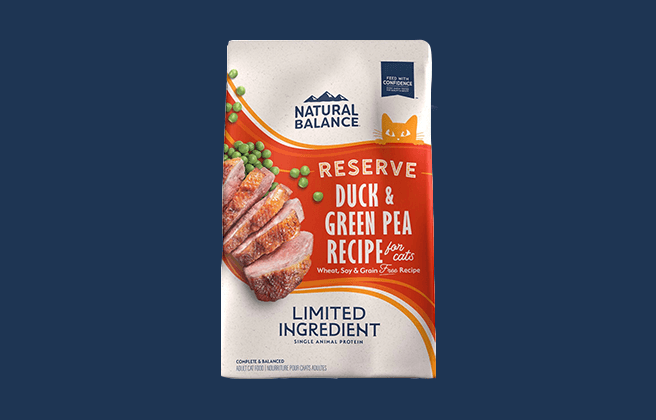
Natural Balance Limited Ingredient Reserve Grain-Free Duck & Green Pea Formula received the Cat Food Advisor’s high rating: 4 stars.
It is one of three recipes in this dry cat food range made by Natural Balance which was formed in 1989 but since 2015 has been owned by J.M Smucker Company.
Natural Balance Limited Ingredient Reserve Grain-Free Duck & Green Pea Formula derives the bulk of its protein from duck, which is naturally rich in the 11 essential amino acids required by a cat to sustain life.
Dry matter label analysis reveals a wet recipe containing 33.3% protein, 13.3% fat and 45.3% carbohydrates, with a fat-to-protein ratio of 40%.
Natural Balance Limited Ingredient is made from high-quality ingredients with a single-source animal protein. It is also rich in fatty acids such as omega-3 and omega-6.
Read our review of the full Natural Balance Limited Ingredient (Dry) range hereThings we like
- Quality protein ingredients
- Contains omega-3 and omega-6 fatty acids
- Wheat and soy-free
Main Ingredients Duck, duck meal, peas, chickpeas, lentils Texture Dry Type Grain-free Protein Percentage 33.3% AAFCO Standards Maintenance Best For Adult cats Save up to 35%
with Autoship
See discount in cartSample buyer review...
"This "limited ingredient" cured my cat from allergies and horrible break-out scabs caused by regular cat food."
-
Canidae Pure Goodness Salmon Recipe (Dry)
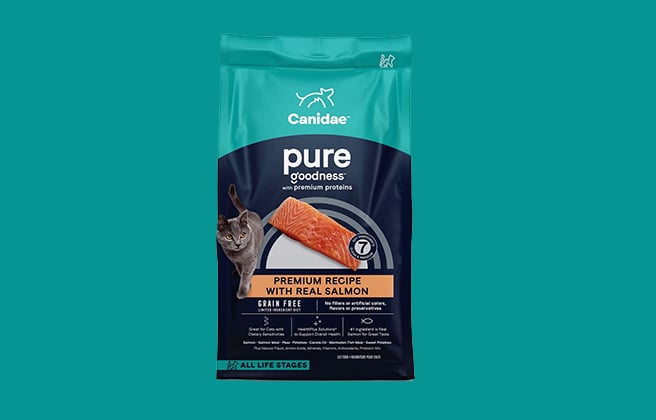
Canidae Grain-Free Salmon Recipe received the Cat Food Advisor rating, 4 stars.
It is one of four dry products in a range made by Canidae, which was founded in 1996. It is still an independently owned pet food company under the control of its original owners.
Canidae Grain-Free Salmon Recipe derives the bulk of its protein from salmon which is not only high in protein but also omega-3 fatty acids.
Dry matter label analysis reveals a dry recipe containing 35.2% protein, 18.7% fat and 38.2% carbohydrates . . . with a fat-to-protein ratio of 53%.
This recipe formula uses real fish first, paired with whole ingredients such as sweet potatoes and peas, and never corn, wheat or soy.
Read our review of the full Canidae PURE (Dry) range hereThings we like
- High protein for premium nutrition
- Limited grain-free ingredients for cats with a sensitive stomach
- Made with whole foods
Main Ingredients Salmon, salmon meal, peas, potatoes, canola oil Texture Dry Type Grain-free Protein Percentage 35.2% AAFCO Standards All life stages Best For Kitten, adult & senior cats Save up to 35%
with Autoship
See discount in cartSample buyer review...
"My cat is allergic to chicken and gluten and this is one of the few foods that fit the bill. Bonus that he likes it! "
Best cat foods
What are the most common ingredients that cause allergies in cats?
Cats can develop allergies to a variety of ingredients, but some are more common culprits than others.
The most common allergens for cats are proteins. Beef, dairy, chicken, and fish are among the top offenders. Novel protein sources such as venison, rabbit, and duck may be better tolerated by cats with known protein allergies.
While true grain allergies are relatively rare in cats, some may be sensitive to certain grains like wheat, corn, and soy. Grain-free cat foods are available to address potential grain sensitivities.
Many adult cats are lactose intolerant, meaning they lack sufficient levels of lactase, the enzyme needed to break down lactose in milk. This can lead to digestive upset and allergic reactions.
Artificial colors, flavors, and preservatives can also contribute to allergic reactions in some cats. Opting for cat foods with minimal artificial additives may be beneficial.
Some cats may be sensitive to common additives and fillers found in commercial cat foods. It’s essential to read ingredient labels and choose high-quality cat foods that prioritize nutritional value.
How do I know if my cat has allergies?
Recognizing allergies in your cat can be challenging, as the symptoms can overlap with other health issues. If you suspect your cat may have allergies, it’s essential to observe their behavior and look for common signs.
Here are some indicators that your cat might be experiencing allergies:
- Itching and Scratching: Excessive itching, scratching, or biting at the skin can be a sign of allergies.
- Hair Loss: Allergic reactions may lead to hair loss, especially in areas where the cat is scratching or licking excessively.
- Vomiting: Allergies can sometimes cause gastrointestinal upset, leading to vomiting.
- Diarrhea: Changes in bowel habits, including diarrhea, may occur in cats with food allergies.
- Sneezing and Watery Eyes: Environmental allergies, such as pollen or dust, can cause respiratory symptoms similar to those in humans, such as sneezing and watery eyes.
- Ear Scratching: Cats with allergies may develop ear infections, leading to increased scratching at the ears.
- Lethargy: Allergic reactions can sometimes make cats feel unwell, leading to lethargy or a decrease in activity levels.
- Changes in Appetite: Allergies may affect a cat’s appetite, causing them to eat less or lose interest in food.
Other than changing diet, what other treatments are available for cats with allergies?
The treatment for cats with allergies depends on the type of allergy and the specific symptoms your cat is experiencing.
Work with your veterinarian to identify the specific allergen causing the reaction. This may involve allergy testing or elimination diets.
Once the allergen is identified, take steps to minimize your cat’s exposure to it. For example, if your cat is allergic to a certain protein, switch to a hypoallergenic cat food.
Some cats may benefit from antihistamines to alleviate itching and other allergy symptoms. However, not all cats respond well to these medications, and their use should be discussed with your vet.
In severe cases, your veterinarian may prescribe corticosteroids to reduce inflammation and suppress the immune response. Long-term use of steroids should be carefully monitored due to potential side effects.
For environmental allergies, such as pollen or dust mites, your veterinarian may recommend immunotherapy. This involves administering small amounts of the allergen to desensitize the cat’s immune system over time.
If your cat is allergic to flea bites, strict flea control measures are essential. Use flea preventatives as directed by your veterinarian.
Environmental Modifications:
Make changes to your home environment to reduce exposure to allergens. This may include using air purifiers, keeping windows closed during high pollen seasons, and using hypoallergenic bedding.
Schedule regular checkups with your veterinarian to monitor your cat’s condition and adjust the treatment plan as needed.
Always follow your veterinarian’s advice regarding the treatment of your cat’s allergies. Self-diagnosis and treatment without professional guidance can lead to ineffective or potentially harmful outcomes. If you suspect your cat has allergies, consult with your vet to determine the underlying cause and develop a tailored treatment plan for your feline companion.
Sources
Cat Food Advisor is reader supported. If you buy using links on this page, we may earn a referral fee.
Article reviewed by
Veterinarian
Dr Georgia Jeremiah has a first class honors degree in comparative pathology with field experience in anatomic and clinical pathology, studying disease processes in a multitude of species.






